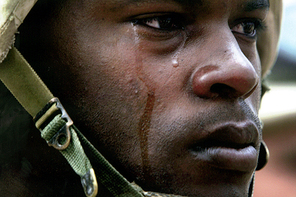
Writer’s Name: James W. Lewis
Title: Knowing the Signs of PTSD
With a scheduled drawdown from Afghanistan by 2014, our military warriors will return to the States after multiple tours of hazardous duty in a hostile environment. Many of them will bear little resemblance to the person they were prior to deployment, having witnessed the horrors of war. Some will need to adjust to life at home with amputated limbs, burn scars, and debilitating injuries; others won’t have any visible wounds, seemingly normal on the surface, but suffering from a kind of pain you can’t see.
Post Traumatic Stress Disorder (PTSD) is a mental health disorder that can occur after someone goes through a traumatic event like war, assault, or disaster. According to the Department of Veteran Affairs, experts believe approximately 15% of veterans that served in Operation Enduring Freedom and Operation Iraqi Freedom and 30% from prior wars (like Vietnam) have PTSD.
In other words, the war isn’t over for them, despite shedding the uniform and re-entering the civilian world. If left unchecked, this condition may negatively impact a veteran’s ability to sustain a healthy relationship with friends and family, find employment, or even interact around groups of people. To prevent this condition from worsening, it’s important to pay attention to unusual changes in behavior. Three main types of symptoms may indicate PTSD:
Hyperarousal. The veteran may be on constant alert and easily agitated, which is called increased emotional arousal. He or she may have trouble sleeping, problems concentrating, and experience outbursts of anger. He or she may always be on guard and in fighting mode, ready to attack at any time.
Avoidance. The veteran may do whatever it takes to stay away from anything linked to the traumatic event, including the location where it happened, media coverage of the event, or what they were doing at the time (like eating a particular type of food). Crowds may make them extremely uncomfortable, so riding public transportation or even being in a grocery store for long periods of time may be difficult.
Re-experiencing. A veteran may “see” or relive the traumatic event a number of ways. It could be a nightmare, bad memories that seemingly come out of nowhere, or flashbacks triggered by a sharp noise, like glass breaking or a car backfiring. The visions may seem so real it could appear like the event is happening all over again. Feelings of fear or guilt may overwhelm the veteran.
Congress recognized the need to address problems associated with veterans readjusting to civilian life, so the Vet Center Program was implemented to provide free counseling services for veterans and their family members. Vet centers are located in communities around the country and are a part of the Department of Veteran Affairs. They also provide other forms of counseling, such as for sexual trauma and bereavement.
Leading up to 2014, scores of veterans will return home, leave service, and enter the private sector for employment or use the G.I. Bill for school. Many of them may show signs of PTSD, so to ensure they can manage their symptoms, professional help may be needed. Fortunately, veterans or family members can contact a local vet center and start the process for counseling.
You can find more information on PTSD and vet centers at http://www.ptsd.va.gov/ and http://www.vetcenter.va.gov/.
 RSS Feed
RSS Feed
